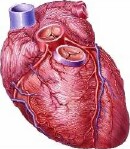
THURSDAY, April 8 (HealthDay News) — Reduced levels or lack of a certain genetic factor are associated with heart failure and aortic aneurysm, say U.S. researchers.
This factor — known as Kruppel-like Factor 15 (KLF15) — protects the heart and aorta’s ability to maintain structural and functional integrity. A team from Case Western Reserve University School of Medicine in Ohio found that patients with heart failure or aortic aneurysm had reduced levels of KLF15.
Research showed that the absence of the gene, combined with stress, was linked with both deadly conditions. Lab animals that lacked the gene were more likely to develop the cardiovascular diseases.
Further investigation revealed that KLF15 uses a common molecular mechanism to provide protective effects in the heart and aorta. Drugs that target this molecular pathway can be used to treat heart failure and aortic aneurysm, the researchers discovered.
An aortic aneurysm is a bulge in the aorta, the main artery that carries blood from the heart to the rest of the body. If the aneurysm bursts, death is possible.
The report is published in the April 7 online edition of the journal Science Translational Medicine.
“This is very rare to find a singular genetic factor that governs the response of the entire cardiovascular system. Our research proves that KLF15 governs the shared diseases of the heart and blood vessels,” study senior author Dr. Mukesh K. Jain, director of the Case Cardiovascular Research Institute, said in a university news release.
The findings suggest that increasing the protective effects of KLF15 in the heart and aorta may prevent the start or progression of heart failure and aortic aneurysm, the researchers said.
More information
The U.S. National Heart, Lung, and Blood Institute has more about heart failure.

